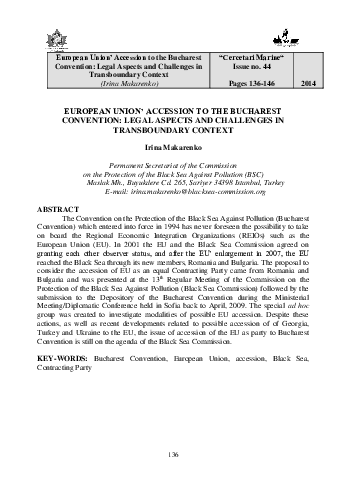European Union’ Accession to the Bucharest Convention: Legal Aspects and Challenges in Transboundary Context
DOI:
https://doi.org/10.55268/CM.2014.44.136Keywords:
Bucharest Convention, European Union, accession, Black Sea, Contracting PartyAbstract
The Convention on the Protection of the Black Sea Against Pollution (Bucharest Convention) which entered into force in 1994 has never foreseen the possibility to take on board the Regional Economic Integration Organizations (REIOs) such as the European Union (EU). In 2001 the EU and the Black Sea Commission agreed on granting each other observer status, and after the EU’ enlargement in 2007, the EU reached the Black Sea through its new members, Romania and Bulgaria. The proposal to consider the accession of EU as an equal Contracting Party came from Romania and Bulgaria and was presented at the 13th Regular Meeting of the Commission on the Protection of the Black Sea Against Pollution (Black Sea Commission) followed by the submission to the Depository of the Bucharest Convention during the Ministerial Meeting/Diplomatic Conference held in Sofia back to April, 2009. The special ad hoc group was created to investigate modalities of possible EU accession. Despite these actions, as well as recent developments related to possible accession of of Georgia, Turkey and Ukraine to the EU, the issue of accession of the EU as party to Bucharest Convention is still on the agenda of the Black Sea Commission.
Downloads
Published
How to Cite
Issue
Section
License
This is an open access journal, which means that all content is freely available without charge to the user or his/her institution. Users are allowed to read, download, copy, distribute, print, search, or link to the full texts of the articles, or use them for any other lawful purpose, without asking prior permission from the publisher or the author. This is in accordance with the BOAI definition of open access.





